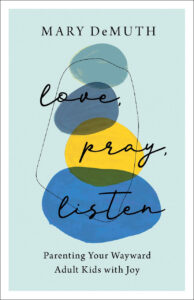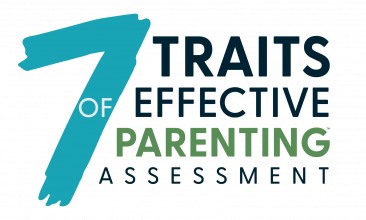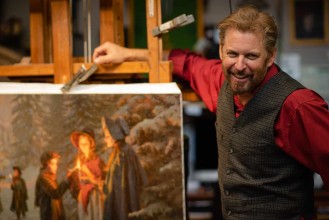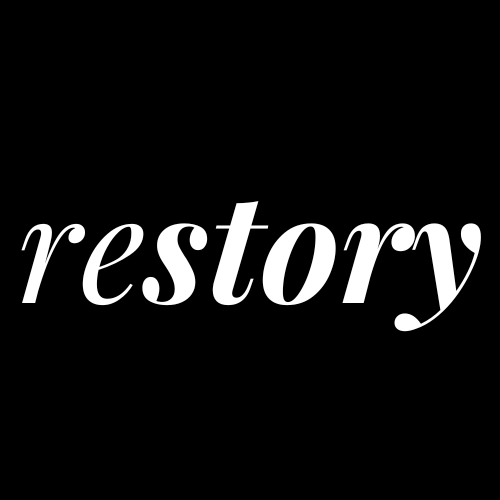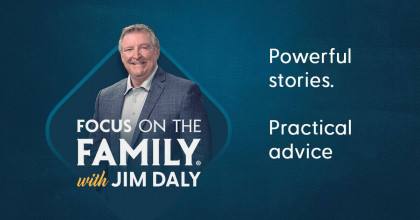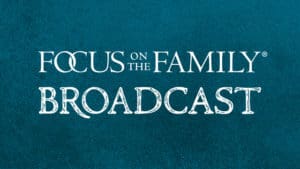Day One
Preview:
Mary DeMuth: And at the end of the week, she came up to me, and she said, “I want you to look me in the eye.” She said, “I think God has something for me to tell you. Your children know that you love them.” And I burst into tears because it was this heavy burden I had been carrying all my life.
End of Preview
John Fuller: Mary DeMuth is here to discuss a really big, uh, topic of concern for so many parents today, and that is wayward adult children. We’re gonna offer you help and hope today on Focus on the Family with Jim Daly. And thanks for joining us.
Jim Daly: John, many people may not know, but we have, uh, a counseling team here, about 20 counselors, and they manage about 2,000 calls a month for people who need some help. And they will engage you, and that’s available to you because donors have made it possible for that.
John: Mm-hmm.
Jim: But one of the top reasons that people will call us is struggles with adult children. So, today we’re gonna talk about that and how to, uh, pray that through and, and do the best you can do as a parent of an adult child that’s maybe not walking with the Lord, or maybe it’s an antagonistic relationship, for whatever reason, our guest today is gonna give you some insights and talk us through managing that relationship for a good outcome.
John: Mm-hmm. And, uh, Mary DeMuth is a podcaster on the Pray Everyday Show. She’s an author of dozens and dozens of books, and she’s a speaker. And, uh, one of the books she’s written that we’re gonna cover today is called Love, Pray, Listen: Parenting Your Wayward Adult Kids with Joy. You can learn more about Mary and this book, uh, at FocusontheFamily.com/broadcast.
Jim: Mary, it’s nice to have you with us here at Focus on the Family.
Mary: Thank you so much for having me. It’s a blessing.
Jim: You’re coming up from Texas. So, tell us how big Texas is.
Mary: (laughing) It’s very big. Very hot. All the things.
Jim: Yeah. Hot and cold, right?
Mary: Yes.
Jim: Um, you’ve heard us, kind of, set this up. It is interesting ’cause we watch the topics of what the counseling team are dealing with ’cause it gives us some insight on what to cover. And I think the main reason you are here is because we have seen an uptick in the number of parents that are struggling with adult children. Now, all three of us at the table here have adult children.
Mary: Mm-hmm.
John: Mm-hmm.
Jim: And so, I’m not gonna say we’re struggling.
Mary: (laughs)
Jim: But, uh, you know, there’s always things that can be in a better place. And as we begin this conversation, i- are you seeing it the same way we’re seeing it?
Mary: I am. And it’s pretty constant. And a lot of my conversations with people in my age bracket, um, this is a, a big topic. And…
Jim: What, what are, what are some of those-
Mary: Yeah.
Jim: … stresses?
Mary: Yeah. So, there’s a lot. There’s, uh, some parents out there whose kids are, um, have substance abuse and they’re spiraling downward. There’s some that are incarcerated. There are some that have deconstructed the faith to oblivion. So, they haven’t reconstructed, they have deconstructed. Um, there are, uh, kids that are exploring different lifestyles and different identities. And, uh, a lot of parents who walked through perhaps like the ’90s and the early 2000s, reading all the parenting books.
I think a lot of us have been, kind of, disillusioned a little bit. Like we… I don’t know. You know, I’ve written a parenting book, so I know what that’s like, but I think, uh, we don’t realize that that’s not a formula.
Jim: Mm-hmm.
John: Mm-hmm.
Mary: And but we… inside, and we internalize this idea that if I do all the right things, at the other end I’m gonna be guaranteed this Christ-following child who never questions and has an amazing life. And, uh, that doesn’t always happen because we birthed people with free will.
Jim: Mm-hmm.
Mary: We really love free will for ourselves, but we really don’t love free will for our adult children. So, that’s what I’ve been seeing.
Jim: You know, it’s so true. You know, and, and I can’t remember how long ago I heard this, but somebody said, “Well, Adam and Eve turned on the Lord,” right? So-
Mary: Yeah.
Jim: … even the Lord suffered with His teenagers, you might say. Mary, I, I… this is very tender, but it is part of your book, and I want to bring up your childhood.
Mary: Mm-hmm.
Jim: It sounded very chaotic. I’m so sorry for you. Both of us lived in chaotic childhoods. The Lord can redeem that.
Mary: Mm-hmm.
Jim: I mean, that’s our story, right? Um, but you were abused sexually as a, as a little girl.
Mary: Mm-hmm.
Jim: Uh, describe a bit, just a bit, of what those circumstances were, what it made you feel like, and how did you, how did you crawl back to-
Mary: Hmm.
Jim: … somewhere near healthy?
Mary: Yeah. I mean, I… they have this scale called the ACE, the adult, or the, um, Adverse Childhood Experiences. And I, I think I have all of them except for one.
Jim: Hmm.
Mary: And so, that’s… I feel like it’s great in terms of I can relate to almost anyone that’s gone any- through anything. But, uh, yes, sexually abused at age five for a year. Um.
Jim: By babysitter’s friends, right?
Mary: Yes. By teenage boys in the neighborhood that were living next door to the babysitter. And then, um, multiple divorces, uh, throughout my childhood, um, a predatory… sexually predatory father, and, uh, then his death when I was 10 years old. And, uh, an only child and super lonely and left alone all the time. Food insecure, drugs in the home, growing drugs in a closet. So, everything that you can think of.
Jim: Wow.
Mary: That was terrible for a little child. I went through. And yet, during all that time, in a godless home where Jesus is only a swear word, I had this longing to know the Lord.
Jim: Hmm.
Mary: And anytime like a secular song would come on that had, like, hints of God or, like, an ascendant way, anything like that, I would just cling to those songs.
Jim: Ah.
Mary: And, eventually, I met Jesus when I was 15 through the ministry of Young Life, right after being very suicidal and, uh, wanting to take my life.
Jim: But you know what’s amazing? That, that sense that the Lord cared about you, somehow you knew that.
Mary: Mm-hmm.
Jim: And I had that same experience.
Mary: Mm-hmm.
Jim: And it’s the hardest thing to express to people, isn’t it?
Mary: It is.
Jim: But people who are desperate saying, “How did you know that you should love God?” It, it felt like, in my case, it was just there and present. Like God’s grace was already there. Do you feel that same way?
Mary: I do. And I, I think for parents of wayward kids, too, that’s a very calming feeling to know that the Lord is pursuing their kids. And He was pursuing me in so many beautiful, powerful ways, um, that I can’t even really explain except just that it was the Lord. Also, another thing… little gift that He gave me was, while those, uh, when that sexual abuse was happening for a year, I knew that what those boys were doing to me was wrong. And that is a gift because most sexual-abuse victims think it’s their fault.
Jim: Mm-hmm.
Mary: And they often…
Jim: So, you put that on them.
Mary: I did.
Jim: Which was awesome.
Mary: And I knew who the evil…
Jim: Yeah.
Mary: What the evil was.
Jim: Uh-huh.
Mary: And I actually also had a lot of gumption. And I told my babysitter that this was going on at five, and, of course, she didn’t do anything about it. And she said that she would tell my mom, and she didn’t. So, I thought my mom knew.
Jim: Mm-hmm.
Mary: And this was still going on. Um, so all these, like, little things that the Lord did were just part of those breadcrumbs of the Lord bringing me to Himself, so that by the time I was 15 and I heard the Gospel, I was just, “So, this is what I’ve been looking for my-
Jim: Yeah.
Mary: … whole life.” And I like to tell audiences, “And then I was completely healed and everything was great.” But that was (laughing), that was actually-
Jim: I’m with you.
Mary: … the beginning of a very long healing journey. And I just wanna let listeners know-
Jim: Yeah.
Mary: … that, um, if you still feel like you’re in the muck and mire, that is very normal, and it’s a very long process.
Jim: I call it the wobbling years-
Mary: Yeah.
Jim: … after you make that commitment. I was 15 as well.
Mary: Mm-hmm.
Jim: And then it was the wobble up until about 22.
Mary: Mm-hmm.
Jim: When I actually got it together and understood what it meant to be committed-
Mary: Mm-hmm.
Jim: … to Christ.
Mary: Mm-hmm.
Jim: So, I had that seven-year span of, you know, the parties on Friday night after the-
Mary: Mm-hmm.
Jim: … football game, and then-
Mary: Mm-hmm.
Jim: … going to church on Sunday, going, “Lord, forgive me for-
Mary: (laughs)
Jim: … all that I did on Friday.” But that’s part of it, right? Um, you are uniquely equipped, I think, to understand adult children-
Mary: Mm-hmm.
Jim: … because of everything you went through, right? And I think in part what you just said, I want to capture, because you were talking about understanding, and you didn’t say that, but understanding what they’re facing, kind of, the, the battle that they’re under right now. Whether you have a daughter or a son who’s 20, 21, what forces are coming at them?
Mary: Mm-hmm.
Jim: Highly sexualized-
Mary: Mm-hmm.
Jim: … culture, drugs, you mentioned earlier-
Mary: Mm-hmm.
Jim: … that can be part of it. How do you feel you connected with your own adult children? And I, I don’t know all of that story, but you can share where they have been at. Did you feel like you understood?
Mary: You know, it’s a really good question. In, in many ways, yes. In some ways, no. And the no is that, um, because I was on my own for so much and I had to just buck up and deal.
Jim: Yeah.
Mary: I kind of, felt like, “You should just figure this out. You know, you should just buck up and deal.”
Jim: Mm-hmm.
Mary: But I, um… so because I, I was actually a… I, you know, I was a good mom, and I nurtured my kids, and I was with them throughout their lives. And, uh, they now come back to me. They… some of them call me every day. And we have this amazing, surprising relationship. Not all of them are walking with Jesus, but we’re still connected. And I think part of that is just holy curiosity for the marvel that they are.
And that, to me, is such a beautiful thing that we as, uh, parents of adult kids can do, is just be like, “I’m so curious. What makes you think this thing that you’re thinking?” or “I’m so curious about, you know, what, uh, are you gonna do about this problem?” And that has really carried me through, that is just to have this holy curiosity of my kids.
Jim: Did you ever feel with your own children, adult children particularly, that nothing’s gonna surprise me?
Mary: (laughs)
Jim: I mean, whatever they do, I’ve already been there. I know it. Nothing’s gonna surprise me. Did they ever surprise you?
Mary: Oh, yes, of course, they surprised me (laughing). I’m a normal mom with normal adult kids that do abnormally weird things. And so, um, yes, definitely. And it did, kind of, unsettle me for sure. Like just this feeling of, “Oh goodness, that modicum of control that I thought I had when they were under my roof,” which was, sort of, an illusion, but we like it so much, really, this just cements that modicum of control. I just realized it wasn’t real. And, uh, that’s the, hence the title of the book, What Can I Do? That’s what I came to the title-
Jim: Yeah.
Mary: … with, what, what are the three things I can do? I can love them. No one’s gonna prevent me from loving them. I can pray for them. They cannot prevent me from praying for them. And I, absolutely, if I’m still… if I haven’t been ghosted by them, I can listen to them. I can listen to their heart, and no one can take that away from me as well.
Jim: Yeah. We’re gonna pick up on those. But you had a friend, Heidi-
Mary: Mm-hmm.
Jim: … so I’m just framing this for you.
Mary: Mm-hmm. Thank you.
Jim: Um, because I think what I experienced as a dad, and I’m not sure that you experienced as, as a mom, coming out of broken homes, you can tend to overdo it a little bit. So, I don’t want to tell everybody how often I took the boys to Disneyland-
John: (laughs)
Mary: Mm-hmm.
Jim: … because when I-
Mary: [inaudible].
Jim: … was a kid, I was not able to go.
Mary: Yes.
Jim: We couldn’t afford it. So, we’ve been far too many (laughing) times to Disneyland. But you can do that in so many ways. And I think you were in the, kind of, the “I love you; I love you,” “Well, I love you too.”
Mary: Mm-hmm.
Jim: Kind of, modality. And Heidi said something to you.
Mary: Yeah. So, when I became a mom, I was absolutely, completely terrified.
Jim: Yeah.
Mary: And I… ’cause I literally, I understood enough to know that you do what is modeled for you. And almost 100% of what was modeled for me was something I did not wanna duplicate.
Jim: Mm-hmm.
Mary: So, my parenting strategy was cry all the time and get on my knees before Jesus ’cause I just didn’t have anything. And I also worried that my children, as you alluded to, um, didn’t know that I love them. And so, because I never knew. So, I was, “I love you, I love you, I love you.” And so, my friend visited me for a week, and she didn’t know, and I didn’t even know I had this issue in my heart.
Jim: Right.
Mary: The Lord knew, but I never voiced it even in prayer. And at the end of the week, she came up to me and she said, “I want you to look me in the eye.” She said, “I think God has something for me to tell you, ‘Your children know that you love them.'” And I burst into tears because it was this heavy burden I had been carrying all my life. And she was able, as an outsider, to say what I desperately needed to hear, and the Lord knew and gave her those words to give to me.
John: Mm-hmm. This is Focus on the Family with Jim Daly. And today, Mary DeMuth is our guest, and, uh, we’re talking about some of the content in her terrific book Love, Pray, Listen: Parenting Your Wayward Adult Kids with Joy. And we wanna encourage you to get a copy of this book and other resources to help you in your parenting journey. Uh, stop by the website, and that’s FocusontheFamily.com/broadcast.
Jim: You know, Mary, often we take on… lemme just say, I can tend to take on too much responsibility and stress. Jean’s certainly there too, in parenting our two adult kids. They’re now 25 and 23. Um, how is our identity in Christ directly linked to a posture of surrender?
Mary: Mm-hmm.
Jim: This is the question.
John: Mm-hmm.
Jim: How do we surrender and say, “Lord, okay, they’re yours. We did the best we could, and here they are-
Mary: Mm-hmm.
Jim: … and now we have to kinda lay the parenting and control stuff down so that they can now be the adults God is calling them to be?”
Mary: I think part of that comes back to remembering when you were in your 20s and if your parents had overreached, how that made you feel. And so, if you can, kind of, crawl into your skin at that time and remember how joyful it is when your parents just loved you and believed in you and were for you, but they weren’t, you know, pulling at the puppet strings. So, that’s one thing.
And then I would say, I think a lot of us have combined and enmeshed our identity with our parenthood. It’s a very common thing, especially, for evangelical parents. And we feel like how our kids turn out… that’s tied to our identity. And I am certainly not immune to that as well. And so, untethering that… and I think this is part of the growth process as a parent of an adult kid, is untethering that. Finding your identity in Jesus alone, not in my parenting prowess, not in how my kids turn out, but just in the fact that I am loved by Jesus.
Jim: Mm-hmm.
Mary: And when you untether that, then it is easier to lay down and, um, and surrender what they are going to become. And that… It’s never easy because we have… we start with high control. When they’re toddlers, “Don’t run in the street!” We grab them. And we’re constantly working ourselves out of a job. Less and less and less control. And then, uh, we lose it all (laughs). And that’s really hard to let go of.
Jim: Yeah. But I, I think you’ve really, uh, expressed that well, because it’s our ability as the parent to begin to release that control that’s so important. And some of us, as parents, we hang onto the control stick.
John: Mm-hmm.
Mary: Mm-hmm.
Jim Daly: And then we have highly dysfunctional adult children. And that’s-
Mary: Mm-hmm.
Jim Daly: … that’s what we’re addressing.
John: Yeah.
Jim: You know, Mary, I’ve been able to travel the world, and so often cultural overlays make a difference, right? And in some cultures, it’s normal for adult children to remain home-
Mary: Mm-hmm.
Jim: … until-
Mary: Mm-hmm.
Jim: … they’re married, or in the, the men’s spot, the young men’s spot that they are, uh, finished with education, and they have their job, et cetera. There seems to be a little bit of a morphing of that in the U.S. It used to be 18 “Bye-bye.”
Mary: (laughs)
Jim: Dropped off at college like you were. “See you later. Call me if you need me, but don’t call too much.” Um, but that has really morphed to where we continue to take care of our young adult children. They may return home, and that is understandable in a financial downturn-
Mary: Mm-hmm.
Jim: … they lose their job, or something happens. It’s nice to have a mom and dad safety net.
Mary: Mm-hmm.
Jim: To be able to come home to. How should we manage some of that, though, with our adult children that need a little extra nest time?
John: Mm-hmm.
Mary: Yeah, great question. And a little extra nest time, and us in Texas, we don’t have basements, so they don’t live in the basement, but they can live in your living area. Um, I would say that there is a precedent biblically to let someone go. And you see the, especially in the marital thing of leaving and cleaving. Um, and when there’s enmeshment there with a family of origin, it can get very difficult.
Jim: Yeah.
Mary: So, I, I definitely see that. But one of the reasons I wrote this book is that we as parents were never given an example or trained about how do you love your kids in their 20s and 30s? Like, how do you… When is it okay to extend some money their way, and when is it enabling? And that’s-
Jim: Mm-hmm.
Mary: … where I have to go back to the Holy Spirit because the Holy Spirit is so wise and-
Jim: Mm-hmm.
Mary: … knows all of our kids, and they’re all different. And, sometimes, to give money to one would be the right thing to do, but to give money to another would be the wrong thing to do. And it’s not just, you know, back and forth. We just have to be super careful and really trust that the Lord has this. And that’s where I wanna just encourage parents of adult kids, this is a season of your life where you are going to grow so much. There’s so much potential.
Jim: You thought it was over? (laughing) Nope.
Mary: No, it’s only just begun.
Jim: No, it’s so true. And that’s a great point. Speak maybe to that, application of that. You, you touched on it, but with younger children, with teens, and then where should we be in that parent-adult-child relationship at 23, 24, 25 when it comes to those control issues, financial or whatever they might be?
Mary: Right. The deepest part of this is we want what’s best for our kids. And I’ll never say that that’s wrong. That is a beautiful part of parenthood, is longing for our kids to thrive and just have this amazing life that you’ve longed for them to have. But as I mentioned earlier, we’re working our way out of a job. And there’s high control to low control. And we’re moving away from it so that when we release them, we’ve trained them to live without us. And our control is almost waning. And by the time they’re 25, of course, it should be gone.
Um, we should be more cheerleaders and coaches than we are directors. And I try to make a rule that I will not give advice unless I’m asked.
Jim: Mm-hmm.
Mary: Um, the other thing I think that’s in play here in terms of giving to our children is what I walked through in my own grief was when I had the grief in front of me of “They’re not making the same decisions I would’ve wanted them to,” that grief blinded me and did cause me to want to control and pull the puppet strings. And it wasn’t until I walked through that and named the grief, walked through the grief, wrote some lament psalms about it, all of that.
Jim: Ah.
Mary: That once I grieved it, I was now able to see God working in their lives. Where I was blind to it before, I could see…
Jim: Mm-hmm.
Mary: Just like God had breadcrumbs for me, I could see that He was laying breadcrumbs for them. And it was the most beautiful treasure hunt that I had ever seen. But this grief over my face, I could not see. I had to work through that. So maybe someone listening today needs to remember, it’s important to grieve if the expectations weren’t met. Your kids are making decisions that are breaking your heart. Grieve it. Talk about it.
Jim: Name it.
Mary: But the parents, we’re terrified to do that-
Jim: Mm-hmm.
Mary: … because it’s an admission that we didn’t do a good job.
Jim: Mm-hmm.
Mary: At least that’s-
Jim: Wow.
Mary: … what we’re thinking.
Jim: There’s a super connection there. I mean, it starts when your kid’s throwing the tantrum at the grocery-
Mary: Yes.
Jim: … store, which you, when you were single, said would never happen-
John: Mm-hmm.
Jim: … when I’m a parent.
Mary: Haha.
Jim: And then it happens, right?
John: Mm-hmm.
Jim: And I mean, I think that embarrassment begins then.
Mary: Mm-hmm.
Jim: And it rolls and gets more mature, like they’re making the wrong decisions. And that is so embarrassing to-
Mary: Mm-hmm.
Jim: … us-
Mary: Mm-hmm.
Jim: … as a family. People at church, what are they gonna say?
Mary: Mm-hmm.
Jim: I mean, whatever it might be. Let me ask you this. What’s the big question that adult kids are asking of their parents?
Mary: Yeah. So, the question that kids are always asking with their behavior, whether they’re four or 24, is, “Will my parents love me if…” And that is why the whole book is structured around 1 Corinthians 13, which was not written to people getting married. It was written to a broken church with broken relationships. So, we’re talking about what is actual love. And love is, um, this supernatural thing that the Lord gives us. It’s agape, it’s “I’m going to love you even if you disappoint me.”
Now, that doesn’t mean that we don’t speak the truth in love. It doesn’t mean that. But it does mean that that’s the fundamental question that all of us are asking everyone, “Will you love me if I fail you? Will you love me if I walk away? Will you love me if I, uh, have same-sex attraction? Will you love me if I yell at the church? Will you love…” all of these things. They’re asking you that. And so, parents, we have the mandate of loving them. And that can look different with each child. And again, that’s where I go back to the Holy Spirit.
Jim: Yeah.
Mary: It’s so important to hear the Spirit and how He directs you.
Jim: You know, in a deeper way, each of our relationships with the Lord is like that.
Mary: Mm-hmm.
Jim: “If…” and people too, “If you really knew me-
Mary: Yeah.
Jim: … would you love me?” Uh, you recommend a two-fold approach to mending a broken relationship with an adult child. When the Lord says we are made for relationship, first with Him and then with-
Mary: Mm-hmm.
Jim: … others, we go by that so fast. And it’s probably the most powerful part of understanding being made in God’s image.
Mary: Mm-hmm.
Jim: That we’re made for relationship. And that includes with our adult children.
Mary: It does.
Jim: But it starts in childhood. Can they trust you?
Mary: Mm-hmm.
Jim: Can they come to you with concerns and questions?
Mary: Mm-hmm.
Jim: Do you lecture them?
John: Mm-hmm.
Mary: Mm-hmm.
Jim: Speak to all of that.
Mary: First, I’ll just raise my hand and say-
Jim: Yeah.
Mary: … (laughs) I lectured.
Jim: I’m not perfect.
Mary: Yes. You know, the part of restoration of a relationship is it always involves going first. And it involves humility.
Jim: Mm-hmm.
Mary: And so, one of the things that I’ve done constantly with my kids, almost to the point that they’re like, “Mom, stop it,” which is, “I’m so sorry I did that when you were 10 years old. Could you please forgive me? I’m sorry when I did that when you were 11. Please forgive me. I yelled and raised my voice when you were 15. Please forgive me.” And they’re like, “Mom, just stop. Stop. We forgive you.”
But it’s very important to me to name what I feel like were my failures and ask for forgiveness. And also ask them into that space in a conversation and say, “Is there something that really harmed you? I want to hear you.” And I may not have seen it the same way, but I wanna enter into that pain. And that’s the start, that humility is the start of restoration, is that admission. ‘Cause if you’ve grown up in a home where a parent has never once apologized, you know how crazy-making it is.
Jim: Yeah. Mary, right at the end, I think for the listeners that heard the beginning of the program and heard your story about abuse and your mom dropping you off and saying, “Okay, have a good life.” I mean, I’m abbreviating, but you felt distanced. She wasn’t in a healthy place. How did you reconcile with your mom? How do you swallow all of the hurt and all the pain and say, “Okay, Mom, I love you”?
Mary: The Lord said to me, “What if she comes back to you? Will you be in a place to receive her?”
Jim: Mm-hmm.
Mary: And so, I worked very hard. But I also wrote a book, a couple of books, that were very honest, which did fracture our relationship. And in my mind, I thought telling the truth ruined everything.
Jim: Mm-hmm.
Mary: Even though I know that we’re to speak the truth in love, and I did it as tenderly as possible, it had ruined everything. And a few years ago, I got a phone call from my mom. She was my biggest antagonist in my spiritual life. She was my persecutor. I get a call from my mom two years ago, and she’s like, “Talk, talk, talk, talk, talk.” And at the very end, she said, “By the way, I’m going to church.”
Jim: Mm-hmm.
Mary: And I about fell off my chair. And in that moment, we started this… I never thought it would happen. It was a 45-year prayer, um, that she is having a journey now. And we are reconciling. And I just wanna tell people, speaking the truth in deep humility and kindness and love doesn’t ruin everything. It gives you a platform from which to start. And that’s what happened with us.
Jim: Mary, that is beautiful. And I want to continue, uh, tomorrow, let’s continue the discussion. And thank you for that vulnerability. I think this is really helpful-
John: Mm-hmm.
Jim: … for the viewers, the listeners, to be able to say, “Yeah, this is right where I’m at,” ’cause so many of us are in that spot. And I wanna come back and talk about other complications for those empty nesters that are still living with some, uh, you know, anchors around them, and how we can wisely and in a God-honoring way continue to move our relationships with our adult children in the right direction. Can we do that?
Mary: Yes. Let’s do it.
Jim: All right. Let’s do it. And listen, this great book by Mary, uh, Love, Pray, Listen: Parenting Your Wayward Adult Kids With Joy, the with Joy just jumps out-
John: Mm-hmm.
Jim: … to me because it’s so critical. Not with instructions, not with lectures, not, you know, parenting your wayward adult kids with joy because that’s honey.
Mary: Mm-hmm.
Jim: That’s something attractive.
John: Mm-hmm.
Jim: To those kids that are struggling, and they want to be loved by you. I so desperately believe that. So, get in touch with us and make a gift of any amount, and we’ll send you a copy of this book as our way of saying thank you for being part of the ministry and getting a great resource to help you.
John: Mm-hmm. Donate and request Mary’s book. Uh, we’re also going to link to a couple of other things. One is our Seven Traits of Effective Parenting assessment, which is gonna help you, uh, learn how to, kind of, preemptively get ready for the release years so, uh, you can do it well. And take the assessment, uh, get the book, make a donation, and, uh, we’ll also link over to Mary’s website where you can learn more about her prayer cards.
And all of that is available at FocusontheFamily.com/broadcast. And when you donate to this ministry, please know you’ll have twice as much impact on families because of a special matching opportunity going on right now. Every dollar you donate is going to be doubled to deliver hope and joy in Christ. So, give today and reach twice as many families.
Just call 800-A-FAMILY, 800-232-6459. Or again, you can donate and get resources at FocusontheFamily.com/broadcast. Thanks for listening to Focus on the Family with Jim Daly. I’m John Fuller, inviting you back as we once again help you and your family thrive in Christ.










